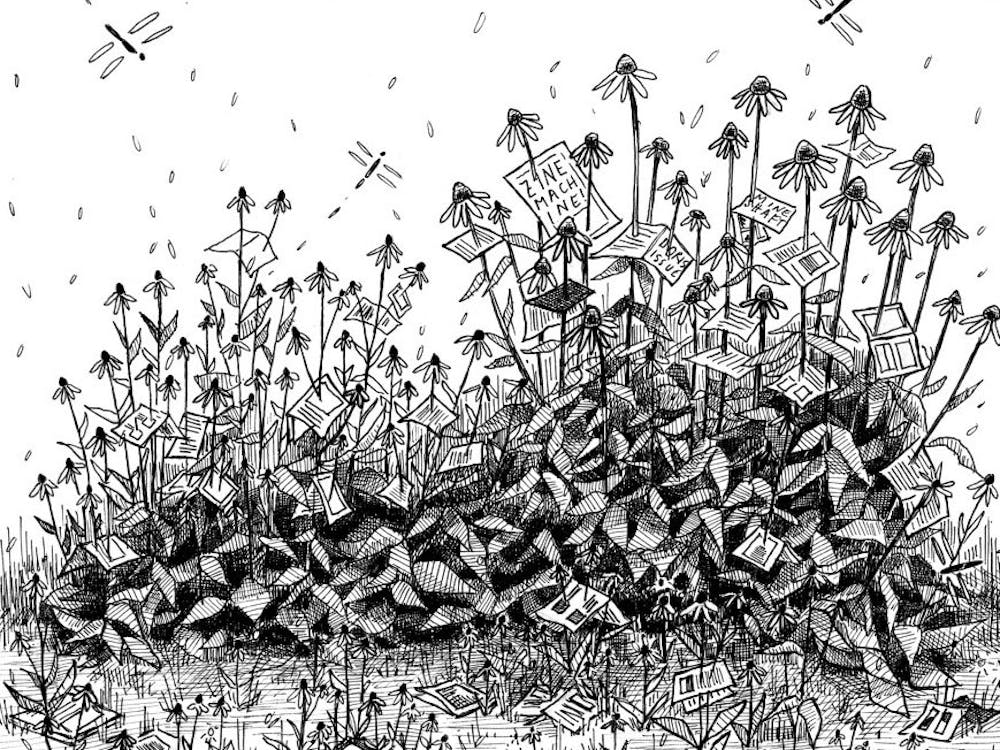From “Friends” to scrunchies, our obsession with ‘90s popular culture is no secret, but the steady rise of zine festivals in the past few years suggests that the era’s counterculture is in resurgence, too. Triangle residents need look no further than Durham’s fifth annual Zine Machine Fest, taking place Sunday at the Durham Armory.
The festival started in 2015, after co-founders Bill Brown, Everett Rand and Bill Fick re-tooled a rejected grant application for a make-your-own-zine truck — a literal “zine machine”— that would have allowed them to bring zine-making supplies to locations around Durham.
“We didn’t get the grant but we thought, ‘We shouldn’t just give up on this,’” Fick said. “So the genesis was this mobile studio, but it just kind of morphed into a festival.”
Focusing on do-it-yourself, non-commercial publications, Zine Machine celebrates zines and the broad spectrum of printed matter, encompassing all forms of printmaking, independent comics and more. The “nebulous” definition of zines is part of what the festival aims to celebrate, according to Brown, who teaches a seminar at UNC-Chapel Hill entitled “Make a Zine! Do-It-Yourself Writing, Publishing and Distribution.”
“The question is really not what are [zines], but what aren’t they?” Brown said. “The better way to describe zines is that they all adopt this spirit of uncompromising creativity. Even though they take on a range of subjects … they’re all about being self-generated, self-published and non-commercial. They’re a place where you can be completely authentic and honest.”
Zines first took form as “fanzines” in the 1930s, wherein fans of sci-fi used zines to review and discuss the ideas of their favorite sci-fi novels and to share what we now know as fan fiction. The medium found its heyday in the 1990s as a staple of punk-rock subculture, specifically in the feminist-punk “riot grrrl” movement.
“Growing up in a small town in west Texas, I was cut off from the culture that was happening in big cities,” Brown said. “I was in various bad punk-rock bands, so in the days before the Internet, [zines] became my window into the wider world. Through zines, I learned about art and interesting musicians and ideas — stuff that was … not happening in my small town.”
During the early 2000s, online blogs became the popular DIY medium, ostensibly leading to the demise of zines. But according to Fick, Brown and fellow co-organizer and visual artist Tristin Miller, today’s zine revival stems from a renewed desire for physical connection in an increasingly digital world.
“I think the newer generation is interested in this handmade approach,” Fick said. “Kind of like the boutique food movement — people are learning how to become butchers or farmers. I think it’s the same thing with zines and printmaking — people are really interested in tactile objects.”
The connection to the physical world that zines enable drew Miller, who was brought onto Zine Machine’s organizing team in 2018, into the culture. First discovering zines at Durham’s Regulator Bookshop, Miller found that the unrefined juxtaposition of images and words in zines she purchased mirrored the contents of her sketchbooks, which she describes as the “foundation of her creative breakthroughs.”
“[In art school, I was] being told to make Art with a capital ‘A’. I felt like zines showed me how I could … make art with a little ‘a’, and be more interested in the process rather than the finished product,” Miller said.
After publishing her first zine in 2009, Miller focused on other creative pursuits until 2015, when a friend encouraged her to respond to a call for vendors at the first-ever Zine Machine Fest. Tabling at the festival, Miller was inspired to start the Greensboro Zine Fest, a workshop-and-education-focused festival now held every July in celebration of International Zine Month.
“Arts are just what a lot of people are really hungry for. They don’t always see their creativity as having a direct impact on their survival, but it really does,” Miller said. “A lot of people don’t see themselves as an artist, but anybody can make a zine. Everybody has a story to share.”
Zine Machine has quickly become the largest printed-matter festival in North Carolina, but according to the organizers, the increased popularity has not changed the spirit of the event. Vendor spots are open on a first-come, first-served basis, and the event is free and family-friendly.
“We never turn anyone away,” Brown said. “There are so many creative people [in the area]. I think that’s the point of [Zine Machine]; it’s a way to be a showcase for this awesome cultural life that’s part of our community. It really is a celebration of uncompromised creation. For all of us, it’s really important to support that and to show it off.”
Get The Chronicle straight to your inbox
Signup for our weekly newsletter. Cancel at any time.

